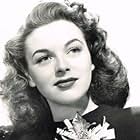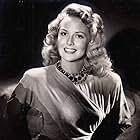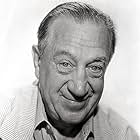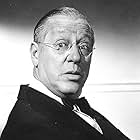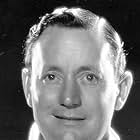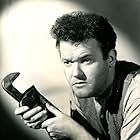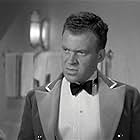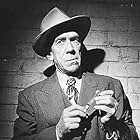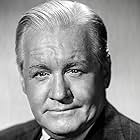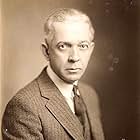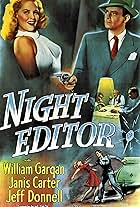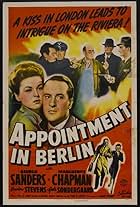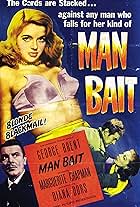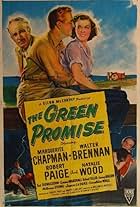A Chicago team of radio scriptwriters must split up when one takes a job with his bride-to-be's father, and another must write commercial jingles.A Chicago team of radio scriptwriters must split up when one takes a job with his bride-to-be's father, and another must write commercial jingles.A Chicago team of radio scriptwriters must split up when one takes a job with his bride-to-be's father, and another must write commercial jingles.
Lewis L. Russell
- Roger Winthrop
- (as Lewis Russell)
Ernie Adams
- Newsman
- (uncredited)
Joseph Crehan
- Chief Dispatcher
- (uncredited)
Kernan Cripps
- Pullman Conductor
- (uncredited)
Hal K. Dawson
- Henry
- (uncredited)
Dudley Dickerson
- Porter
- (uncredited)
John Elliott
- Butler
- (uncredited)
Featured reviews
Chester Morris and Willard Parker are successful jingle writers in Chicago, but just as they get a chance to write for radio in Los Angeles at big, steady money, Parker falls in love with Marguerite Chapman and goes to work for her father's organ company. This leave Morris and gal Friday/girl friend Janis Carter scrambling. As the love birds break up. So Parker gets on the train to Los Angeles, as does Miss Chapman, and they make up and break up again and again amidst a trainload of eccentrics like Hugh Herbert and Jerome Cowan, while conductor Irving Bacon considers retiring. Again.
It's a mishmosh of gags and situations from the classic screwballs like TWENTIETH CENTURY and HIS GIRL FRIDAY, but with enough changes and expert comic actors to keep things moving. Morris is nearing the end of his contract with Columbia, but doesn't seem dismayed by being credited third. Director Ray Enright keeps things moving at a good pace for comedy. With Jerome Cowan, Frank Jenks, and Sam McDaniel.
It's a mishmosh of gags and situations from the classic screwballs like TWENTIETH CENTURY and HIS GIRL FRIDAY, but with enough changes and expert comic actors to keep things moving. Morris is nearing the end of his contract with Columbia, but doesn't seem dismayed by being credited third. Director Ray Enright keeps things moving at a good pace for comedy. With Jerome Cowan, Frank Jenks, and Sam McDaniel.
...because this film is not about love or which way to do it.
Instead it is about a radio show writing duo - Barry Cole (Chester Morris) and his girlfriend Josie (Janis Hart) - who want their one time partner Mitchell Raymond (Willard Parker) to join them in California where they have a one thousand dollar a week contract awaiting them writing for radio. Josie usually did the administrative work and the writing was left to Barry and Mitchell. The problem is, Barry really is not that good, and thus they need Mitchell's talent to succeed, because at this point they have no script! The problem is Mitchell is engaged to a wealthy girl (Marguerite Chapman as Marcia Winthrop) who has Mitchell employed in her father's organ business as an executive and she thinks that radio work is beneath him. However, Marcia's dad is not one of those stuffy to the manor born folk who believe blue bloods should marry blue bloods. He does his best to help get Marcia and Mitch back together because he thinks Mitch is a fine young man.
So it is up to Barry to find a way to coax Mitch away from his fiancée and on to a train to California. Now this involves all kinds of dirty tricks on Barry's part, some on the train, some off, helped along with a generous portion of misunderstandings. On the train there are two eccentric gentlemen played by Hugh Herbert and Jerome Cowan who also figure heavily into the plot. The observer of all of the strange goings on during the train trip is a nervous conductor played by Irving Bacon who keeps threatening to go "back into retirement" if this nonsense continues. Why was this a big deal? Because with the men still away at war - it's not like they came home the day after VJ Day - the older retired fellows were relied upon to take up some of the slack in the work force.
Honestly, it is more fun than "The Twentieth Century" and probably not that well remembered only because the stars involved here were not as big as in 1934's "Twentieth Century". I have to say that Chester Morris and his energy and talent for comedy and mischief absolutely make this film. I have no idea why he is third billed when he is the fastest and funniest member of the cast.
Just one more thing - I really like how this film doesn't ignore WWII and its lingering effects just because the war has been over for a few months. The train stations are still full of sailors and their sea bags, and a WAC even figures into one of the comic misunderstandings on the train.
Highly recommended if you can ever find a copy.
Instead it is about a radio show writing duo - Barry Cole (Chester Morris) and his girlfriend Josie (Janis Hart) - who want their one time partner Mitchell Raymond (Willard Parker) to join them in California where they have a one thousand dollar a week contract awaiting them writing for radio. Josie usually did the administrative work and the writing was left to Barry and Mitchell. The problem is, Barry really is not that good, and thus they need Mitchell's talent to succeed, because at this point they have no script! The problem is Mitchell is engaged to a wealthy girl (Marguerite Chapman as Marcia Winthrop) who has Mitchell employed in her father's organ business as an executive and she thinks that radio work is beneath him. However, Marcia's dad is not one of those stuffy to the manor born folk who believe blue bloods should marry blue bloods. He does his best to help get Marcia and Mitch back together because he thinks Mitch is a fine young man.
So it is up to Barry to find a way to coax Mitch away from his fiancée and on to a train to California. Now this involves all kinds of dirty tricks on Barry's part, some on the train, some off, helped along with a generous portion of misunderstandings. On the train there are two eccentric gentlemen played by Hugh Herbert and Jerome Cowan who also figure heavily into the plot. The observer of all of the strange goings on during the train trip is a nervous conductor played by Irving Bacon who keeps threatening to go "back into retirement" if this nonsense continues. Why was this a big deal? Because with the men still away at war - it's not like they came home the day after VJ Day - the older retired fellows were relied upon to take up some of the slack in the work force.
Honestly, it is more fun than "The Twentieth Century" and probably not that well remembered only because the stars involved here were not as big as in 1934's "Twentieth Century". I have to say that Chester Morris and his energy and talent for comedy and mischief absolutely make this film. I have no idea why he is third billed when he is the fastest and funniest member of the cast.
Just one more thing - I really like how this film doesn't ignore WWII and its lingering effects just because the war has been over for a few months. The train stations are still full of sailors and their sea bags, and a WAC even figures into one of the comic misunderstandings on the train.
Highly recommended if you can ever find a copy.
"One Way to Love" turns out to be a meaningful title for this film which is primarily a cross-country ride onboard a train just after the Second World War had concluded. The film focuses on an assorted collection of people who entertain one another, and especially us the viewers, with a host of mishaps, revised agendas, and misinterpreted and misplayed intentions. I have seen a lot of movies in my day, but I don't remember one like this, where 75%of the film's running time is spent on board a train where no evil skullduggery happens or no onboard murders are committed that need to be solved.
The movie is so well written, all scenes seemingly logical, complete, and orderly. And thanks to the spirited cast, who obviously enjoy working with one another, the dialog between the characters just flows naturally. Chester Morris, of course, is the delightfully breezy and energetic engine that keeps the entire cast on the track. The first few minutes of the picture are a little slow to get going, but soon the show really takes off and we are in for a fun ride!
The movie is so well written, all scenes seemingly logical, complete, and orderly. And thanks to the spirited cast, who obviously enjoy working with one another, the dialog between the characters just flows naturally. Chester Morris, of course, is the delightfully breezy and energetic engine that keeps the entire cast on the track. The first few minutes of the picture are a little slow to get going, but soon the show really takes off and we are in for a fun ride!
Although he's listed third in the credits, clearly Chester Morris is the lead in this Columbia picture. Barry Cole (Morris) is upset to learn that the writer for his radio program is quitting. Apparently the man's fiancee doesn't want him writing radio shows. While this makes little sense, nor why a man would marry such a woman, I kept watching...and am glad I did. Most of the rest of the film is set aboard a train from New York to Hollywood...there Barry manipulates everyone so he can have the writer from The Green Scorpion back on the show...as well as his securing a sponsor for the show. The film has some cute characters and situations....especially when private detectives board the train looking for a mentally ill man who just might be the program's new sponsor!
Overall, this is a cute comedy...especially near the end of the picture. Well written and enjoyable...and worth seeing.
Overall, this is a cute comedy...especially near the end of the picture. Well written and enjoyable...and worth seeing.
"One Way to Love" is a good Columbia comedy with four lesser known lead actors and actresses of the day. But, Willard Parker as Mitch Raymond, Chester Morris as Barry Cole, Janis Carter as Josie Hart and Marguerite Chapman as Marcia Winthrop put on a good show. This is one of several films set on trains in the 1940s and 1950s when railroads were still the main means of long distance travel.
Much of the story takes place on the train, and the comedy is very good. Contributing to that is a supporting cast that has some well-known supporting actors. Hugh Herbert is Eustace Trumble, Jerome Cowan is A. J. Gunther, Roscoe Karns is Hobie Simmons and Irving Bacon is the Train Conductor.
Barry and Josie hoodwink Mitch into going to Hollywood with him where Barry says they have a sure job at $1,000 a week. Mitch breaks up with Marcia, whom he loves. Her dad owns an organ company where Mitch has been working. She wanted him to leave radio as a writer to settle down working for her dad. But dad talks Marcia into taking a trip to get away, and he already has got a ticket for her on the train that Mitch will be taking the next day. When she boards the train, Josie also shows up, having bought her own ticket.
There's some good humor in how they all wind up on the train together, but the comedy ramps up as they meet a couple of guys who offer them better radio deals. Irving Bacon's train conductor winds up flummoxed by the time this film is over. This is a good, lesser known comedy that most people should enjoy many decades later.
Here are some favorite lines from the film.
Marcia Winthrop, "Are you sure, dear, that you wanna continue working in this , um, morgue?" Mitchell Raymond, "Yeah, I like morgues. I mean, uh, I'm used to it now."
Marcia, "I don't want you to have any regrets after we're married." Mitch, "Darling, after we're married how could I have any regrets?" Josie, "We're cooked."
Marcia, "And if he thinks I'm gonna forgive hm, he's sadly mistaken." Roger Winthrop, "That's the spirit, Marcia. Don't you go back to him. You make him come crawling back to you. And make sure that he has a good long way to crawl." Marcia," That's exactly what I intend to do."
Roger Winthrop, "Why don't you take a nice long train trip somewhere?" Marcia, "What for?" Winthrop, "Because if Mitch really loves you, he'll be on that train with you."
Marcia, "But I can stay with Aunt Emily in Florida." Roger Winthrop, "Well, who wants to stay with that old hag? That's one of the reasons California's better for you."
Roger Winthrop, "I've got it. We'll tell your mother. Then everybody in Chicago'll know it."
Barry Cole, "Who'd of thought that Mitch and me would ever be separated by an organ company?" Josie, "Why, it's like taking Damon away from uh, from uh, uh, what's the name?" Barry, "Yes. Or Amos and Andy."
A. J. Gunther, "Are you going far?" Marcia Winthrop, "Not as far as you'd like." Gunther, "Beauty plus wit - a rare combination. Hard to find these days."
Eustace Trumble, "What's the matter with your friend?" Josie Hart, " Oh, um, fever - he was lost in the jungle several years ago" Trumble, "You don't say. What was he doing there?" Josie, "Um, trying to find his way out."
Railroad porter, "Excuse me, sir, but does you always wear pajamas under your suit?" Barry, "Always. I never know when I'm gonna have one of these attacks."
Barry, "Well, here's goodbye to Aunt Trudy's Pie."
Barry, "This shouldn't happen to a dog." Josie, "But it did." Barry, "This is no time to be funny." Josie, "What do you want me to do - cry?"
Much of the story takes place on the train, and the comedy is very good. Contributing to that is a supporting cast that has some well-known supporting actors. Hugh Herbert is Eustace Trumble, Jerome Cowan is A. J. Gunther, Roscoe Karns is Hobie Simmons and Irving Bacon is the Train Conductor.
Barry and Josie hoodwink Mitch into going to Hollywood with him where Barry says they have a sure job at $1,000 a week. Mitch breaks up with Marcia, whom he loves. Her dad owns an organ company where Mitch has been working. She wanted him to leave radio as a writer to settle down working for her dad. But dad talks Marcia into taking a trip to get away, and he already has got a ticket for her on the train that Mitch will be taking the next day. When she boards the train, Josie also shows up, having bought her own ticket.
There's some good humor in how they all wind up on the train together, but the comedy ramps up as they meet a couple of guys who offer them better radio deals. Irving Bacon's train conductor winds up flummoxed by the time this film is over. This is a good, lesser known comedy that most people should enjoy many decades later.
Here are some favorite lines from the film.
Marcia Winthrop, "Are you sure, dear, that you wanna continue working in this , um, morgue?" Mitchell Raymond, "Yeah, I like morgues. I mean, uh, I'm used to it now."
Marcia, "I don't want you to have any regrets after we're married." Mitch, "Darling, after we're married how could I have any regrets?" Josie, "We're cooked."
Marcia, "And if he thinks I'm gonna forgive hm, he's sadly mistaken." Roger Winthrop, "That's the spirit, Marcia. Don't you go back to him. You make him come crawling back to you. And make sure that he has a good long way to crawl." Marcia," That's exactly what I intend to do."
Roger Winthrop, "Why don't you take a nice long train trip somewhere?" Marcia, "What for?" Winthrop, "Because if Mitch really loves you, he'll be on that train with you."
Marcia, "But I can stay with Aunt Emily in Florida." Roger Winthrop, "Well, who wants to stay with that old hag? That's one of the reasons California's better for you."
Roger Winthrop, "I've got it. We'll tell your mother. Then everybody in Chicago'll know it."
Barry Cole, "Who'd of thought that Mitch and me would ever be separated by an organ company?" Josie, "Why, it's like taking Damon away from uh, from uh, uh, what's the name?" Barry, "Yes. Or Amos and Andy."
A. J. Gunther, "Are you going far?" Marcia Winthrop, "Not as far as you'd like." Gunther, "Beauty plus wit - a rare combination. Hard to find these days."
Eustace Trumble, "What's the matter with your friend?" Josie Hart, " Oh, um, fever - he was lost in the jungle several years ago" Trumble, "You don't say. What was he doing there?" Josie, "Um, trying to find his way out."
Railroad porter, "Excuse me, sir, but does you always wear pajamas under your suit?" Barry, "Always. I never know when I'm gonna have one of these attacks."
Barry, "Well, here's goodbye to Aunt Trudy's Pie."
Barry, "This shouldn't happen to a dog." Josie, "But it did." Barry, "This is no time to be funny." Josie, "What do you want me to do - cry?"
Did you know
- TriviaThe film's New York television debut was 20 January 1958 on Channel 7, (WABC).
- Quotes
Roger Winthrop: I've got it. We'll tell your mother. Then everybody in Chicago'll know it.
Details
- Release date
- Country of origin
- Language
- Also known as
- Hail the Chief
- Production company
- See more company credits at IMDbPro
- Runtime1 hour 23 minutes
- Color
- Aspect ratio
- 1.37 : 1
Contribute to this page
Suggest an edit or add missing content









